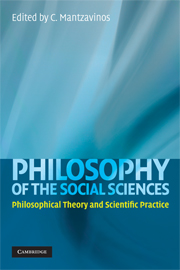Book contents
- Frontmatter
- Contents
- List of Contributors
- Acknowledgements
- Introduction
- Part I Basic Problems of Sociality
- 1 Language and Social Ontology
- Comment
- 2 Shared Agency
- Comment
- 3 The Reality of Group Agents
- Comment
- Part II Laws and Explanation in the Social Sciences
- Part III How Philosophy and the Social Sciences Can Enrich Each Other: Three Examples
- Epilogue
- Name Index
- Subject Index
Comment
Where Is the Social?
Published online by Cambridge University Press: 05 June 2012
- Frontmatter
- Contents
- List of Contributors
- Acknowledgements
- Introduction
- Part I Basic Problems of Sociality
- 1 Language and Social Ontology
- Comment
- 2 Shared Agency
- Comment
- 3 The Reality of Group Agents
- Comment
- Part II Laws and Explanation in the Social Sciences
- Part III How Philosophy and the Social Sciences Can Enrich Each Other: Three Examples
- Epilogue
- Name Index
- Subject Index
Summary
Michael Bratman's thesis builds up shared intentions on the basis of individual intentions, refusing the specificity of Searles's “we-intention” on the one hand, and Gilbert's “joint commitment” on the other. It has a strong “individualistic” commitment, since the aim is to proceed from individual intentions to shared intentions, without introducing any kind of irreducible social level that would not depend on properties of individual intentions. Indeed, the social level is said to “emerge” from an individual level, which is “at the bottom” of “modest forms of sociality.” Let us stress a point that is not, naturally, the focus of Bratman's chapter: the argument rests on a series of metaphors like “bottom,” “level,” “emergence” and others of similar ilk that oppose the locus of the “individual” and the locus of the “social.” Since he intends to examine the nature of both individual and shared intention “under a philosophical microscope,” it should be noted straightforwardly that such a microscope has very conceptual lenses that should themselves be examined under a sociological microscope. If you refer to the social, should it be part of the microscope or of the object seen under it? It seems to us that all those metaphors used to design the place of the social are not very clear. Social scientists often build up the social on the basis of the individual; they equally often refuse to construct things this way when they accept a specific “social level,” the notion of emergence being here ambiguous, since it can refer either to an irreducible social level or conversely to a reducible phenomenon dependent on antecedent individual elements.
- Type
- Chapter
- Information
- Philosophy of the Social SciencesPhilosophical Theory and Scientific Practice, pp. 60 - 66Publisher: Cambridge University PressPrint publication year: 2009



